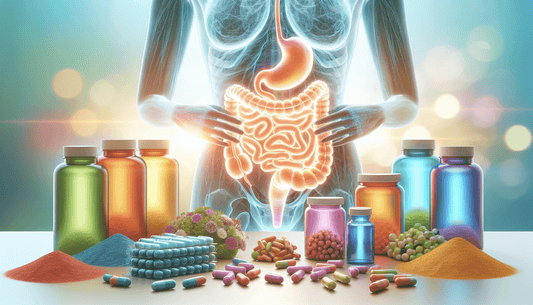Unlock Vitality: Discover the Best Digestion Health Supplements

- Unlock Vitality: Discover the Best Digestion Health Supplements
- Introduction to Digestion Health Supplements
- Understanding the Importance of Digestive Health
- What Are Digestion Health Supplements?
- Why Consider Supplements for Digestive Health?
- Key Ingredients in Effective Digestion Health Supplements
- Probiotics: Beneficial Bacteria for Your Gut
- Digestive Enzymes: Catalysts for Better Digestion
- Fiber: The Unsung Hero of Digestive Health
- Herbal Ingredients: Traditional Aid for Modern Digestion
- How to Choose the Right Digestion Health Supplement
- Identifying Your Specific Digestive Needs
- Understanding Labels and Dosage
- Quality Indicators: Certifications and Laboratory Testing
- Consulting with Healthcare Professionals
- Benefits of Digestion Health Supplements
- Improved Gut Flora and Digestion
- Enhanced Nutrient Absorption
- Overall Health and Well-being
- Are There Any Side Effects?
- Integrating Digestion Health Supplements into Your Routine
- When and How to Take Them for Optimal Results
- Complementary Lifestyle Changes for Better Digestive Health
- Frequently Asked Questions About Digestion Health Supplements
- Are Digestion Health Supplements Safe for Long-term Use?
- Can I Use These Supplements if I Have Specific Dietary Restrictions?
- How Quickly Can I Expect Results?
- Conclusion: Unlocking Vitality Through Digestive Health
- The Significance of Prioritizing Digestive Health
- Encouragement to Make Informed Choices for a Healthier Future
Introduction to Digestion Health Supplements
Understanding the Importance of Digestive Health
Your digestive system serves as the cornerstone of overall wellness, functioning as the primary gateway through which nutrients enter your bloodstream. When this intricate system falters, the repercussions extend far beyond mere discomfort. Suboptimal digestion can manifest as chronic fatigue, nutrient deficiencies, immune dysfunction, and even mood disturbances. The gastrointestinal tract houses approximately 70% of your immune cells, making digestive health inextricably linked to your body's defense mechanisms. This biological reality underscores why maintaining digestive equilibrium is paramount rather than optional.
What Are Digestion Health Supplements?
Digestion health supplements encompass a diverse array of products specifically formulated to support, enhance, or restore optimal gastrointestinal function. These supplements typically contain ingredients that address various aspects of the digestive process—from breaking down food components to supporting beneficial gut bacteria. Unlike broad-spectrum multivitamins, these specialized formulations target the complex ecosystem within your digestive tract. Their compositions vary widely, ranging from single-ingredient products to comprehensive blends designed to address multiple digestive concerns simultaneously.
Why Consider Supplements for Digestive Health?
Modern lifestyles present unprecedented challenges to digestive wellness. Processed foods, chronic stress, sedentary habits, and environmental toxins collectively compromise digestive efficiency. Even individuals who maintain conscientious dietary practices may experience digestive insufficiencies due to aging, medication use, or genetic predispositions. Digestion health supplements offer a strategic intervention that can help bridge these gaps. They provide concentrated, bioavailable forms of compounds that support digestive processes, potentially alleviating discomfort while enhancing nutrient utilization.
For those experiencing symptoms like bloating, irregular bowel movements, or post-meal discomfort, quality digestive supplements can provide meaningful relief. Puraiva Nutrition's Digestin Digestive Enzymes exemplifies this approach with its comprehensive formula designed to address multiple aspects of digestive function.
Digestin combines plant-based enzymes that facilitate the breakdown of proteins, fats, carbohydrates, and fiber—effectively enhancing your body's natural digestive capabilities. The formula includes amylase for starches, protease for proteins, lipase for fats, and cellulase for plant fibers, creating a complete digestive support system. For those who experience discomfort after meals or suspect they're not fully absorbing nutrients, Digestin offers a natural solution without harsh stimulants or artificial ingredients.
Beyond addressing symptoms, Digestin works proactively to improve nutrient absorption, potentially enhancing energy levels and overall well-being. Its enzyme blend mimics your body's natural digestive processes, making it particularly valuable for those whose enzyme production may be compromised due to age, stress, or other factors.
Key Ingredients in Effective Digestion Health Supplements
Probiotics: Beneficial Bacteria for Your Gut
Probiotics represent living microorganisms that, when administered in adequate amounts, confer health benefits to the host. These beneficial bacteria primarily belong to the Lactobacillus and Bifidobacterium genera, though emerging research highlights the value of diverse strains. Their mechanism involves competitive exclusion of pathogenic microbes, production of antimicrobial substances, and modulation of immune responses. The colonization of these beneficial organisms helps maintain microbial homeostasis within the intestinal environment, potentially alleviating conditions ranging from antibiotic-associated diarrhea to irritable bowel syndrome.
Digestive Enzymes: Catalysts for Better Digestion
Digestive enzymes function as biological catalysts that accelerate the breakdown of macronutrients into absorbable components. These specialized proteins include:
- Amylase - converts complex carbohydrates into simple sugars
- Protease - breaks down proteins into amino acids
- Lipase - transforms fats into fatty acids and glycerol
- Lactase - specifically digests lactose (milk sugar)
Supplemental enzymes may prove particularly beneficial for individuals with enzyme insufficiencies or those consuming difficult-to-digest foods. They operate by reducing the metabolic burden on the pancreas and small intestine, facilitating more complete digestion and potentially minimizing gastrointestinal distress.
Fiber: The Unsung Hero of Digestive Health
Dietary fiber encompasses non-digestible carbohydrates that traverse the digestive tract largely intact, yet exert profound effects on gastrointestinal function. Soluble fibers (e.g., psyllium, inulin) form viscous gels that slow digestion and modulate nutrient absorption, while insoluble fibers (e.g., cellulose, lignin) add bulk to stool and accelerate intestinal transit. Beyond mechanical effects, fermentable fibers serve as prebiotics—substrates that selectively nourish beneficial gut bacteria. This bacterial fermentation produces short-chain fatty acids that nourish colonic cells, reduce inflammation, and maintain intestinal barrier integrity.
"The health of the microbiome may be the single most important determinant of your health and longevity. Fiber is the primary nutrient that supports this critical ecosystem." - Dr. Will Bulsiewicz, gastroenterologist and author
Herbal Ingredients: Traditional Aid for Modern Digestion
Botanical preparations have supported digestive health across cultures for millennia. Contemporary research increasingly validates these traditional applications. Ginger (Zingiber officinale) demonstrates prokinetic properties, enhancing gastric emptying and intestinal transit. Peppermint (Mentha piperita) contains menthol, which relaxes gastrointestinal smooth muscle, potentially relieving spasmodic discomfort. Slippery elm (Ulmus rubra) forms a protective mucilage that soothes irritated mucous membranes. These botanicals often work synergistically with other digestive supplements, addressing both symptoms and underlying imbalances through their complex phytochemical profiles.
How to Choose the Right Digestion Health Supplement
Identifying Your Specific Digestive Needs
Selecting an optimal digestive supplement begins with a candid assessment of your specific gastrointestinal concerns. Bloating and gas might signal enzyme insufficiency or bacterial imbalance, while irregular bowel movements could indicate fiber deficiency or dysbiosis. Heartburn sufferers may benefit from different formulations than those experiencing lower abdominal discomfort. Track your symptoms methodically, noting their relationship to meals, stress levels, and sleep quality. This personalized digestive profile becomes your compass when navigating the supplement landscape, steering you toward formulations addressing your particular challenges rather than generic solutions.
Understanding Labels and Dosage
Deciphering supplement labels requires attention to both active ingredients and their quantification. For probiotics, colony-forming units (CFUs) indicate bacterial viability, with effective doses typically ranging from 1-50 billion CFUs depending on the condition being addressed. Enzyme potency appears as activity units (DU for amylase, FIP for lipase, etc.) rather than simple weight measurements. These functional metrics reflect the ingredient's biological activity—a far more relevant measure than mere quantity. Scrutinize the "Other Ingredients" section for potential allergens, fillers, or artificial additives that may undermine digestive wellness. Transparent manufacturers provide clear dosing instructions based on clinical research rather than vague recommendations.
Quality Indicators: Certifications and Laboratory Testing
The supplement industry's regulatory framework necessitates consumer vigilance regarding quality assurance. Reputable manufacturers voluntarily subject their products to rigorous third-party testing and certification. Look for these quality hallmarks:
| Certification/Testing | What It Verifies |
|---|---|
| cGMP (Current Good Manufacturing Practices) | Adherence to FDA-recognized production standards |
| USP (United States Pharmacopeia) | Ingredient identity, strength, quality, and purity |
| NSF International | Product testing and manufacturing facility inspection |
| Third-party assay testing | Verification that ingredients match label claims |
Products bearing these certifications demonstrate the manufacturer's commitment to quality and transparency—crucial considerations when selecting supplements that directly impact your gastrointestinal health.
Consulting with Healthcare Professionals
While digestive supplements generally maintain favorable safety profiles, professional guidance remains invaluable, particularly for individuals with pre-existing health conditions. Gastroenterologists, functional medicine practitioners, and registered dietitians can recommend evidence-based formulations tailored to your specific digestive concerns. These specialists can also identify potential contraindications with medications or underlying conditions that might otherwise go unrecognized. Their expertise becomes especially crucial when digestive symptoms persist despite supplementation, potentially indicating conditions requiring more comprehensive intervention beyond self-directed supplement protocols.
Benefits of Digestion Health Supplements
Improved Gut Flora and Digestion
Quality digestion health supplements can fundamentally transform your gut microbiome's composition and functionality. Probiotics introduce beneficial bacterial strains that may establish colonies, outcompeting pathogenic organisms for resources and attachment sites. This microbial recalibration can normalize bowel movements, reduce gas production, and diminish bloating. Prebiotic ingredients selectively nourish these beneficial bacteria, creating a self-sustaining ecosystem that promotes digestive harmony. Enzymes complement this approach by enhancing the mechanical breakdown of food particles, reducing the substrate available for gas-producing bacterial fermentation. The cumulative effect manifests as smoother digestion with fewer disruptive symptoms interrupting daily activities.
Enhanced Nutrient Absorption
Nutrient malabsorption represents an often-overlooked consequence of suboptimal digestion. Your body may consume nutritious foods yet fail to extract their full benefit. Digestive supplements address this challenge through multiple mechanisms. Enzymes facilitate more complete breakdown of macronutrients into absorbable components. Probiotics help maintain intestinal barrier integrity, preventing inappropriate permeability ("leaky gut") that can compromise absorption. Certain supplement ingredients, like zinc carnosine and glutamine, directly support the regeneration of intestinal villi—the microscopic projections that maximize absorptive surface area. This enhanced nutrient extraction efficiency potentially addresses subclinical deficiencies that may manifest as fatigue, weakened immunity, or poor tissue repair.
Overall Health and Well-being
The digestive system's influence extends far beyond nutrient processing, impacting virtually every aspect of physiology. The gut-brain axis represents a bidirectional communication network through which digestive health directly influences cognitive function, mood regulation, and stress response. By optimizing digestive function, supplements may indirectly enhance mental clarity, emotional stability, and stress resilience. Furthermore, approximately 70-80% of immune tissue resides within the gastrointestinal tract, making digestive health inextricably linked to immune competence. Properly formulated supplements support the integrity of this gut-associated lymphoid tissue, potentially enhancing the body's defense mechanisms against both pathogenic invaders and inappropriate inflammatory responses.
Are There Any Side Effects?
While digestion health supplements generally maintain favorable safety profiles, transient effects may occur, particularly during initial use. Some individuals experience temporary bloating, gas, or altered bowel habits as their digestive ecosystem adjusts to new probiotics or enzymes—a phenomenon termed the "die-off effect" reflecting changes in gut microbial composition. These adjustments typically resolve within days as homeostasis re-establishes. Specific ingredients may trigger individualized responses; for instance, high-FODMAP prebiotic fibers might exacerbate symptoms in those with irritable bowel syndrome. Allergen-sensitive individuals should scrutinize ingredient lists for potential reactants like dairy (in some probiotics) or wheat (in certain enzyme formulations). These considerations underscore the importance of starting with lower doses and gradually increasing to the recommended amount while monitoring your body's response.
Integrating Digestion Health Supplements into Your Routine
When and How to Take Them for Optimal Results
Timing significantly influences the efficacy of digestive supplements. Enzyme formulations generally yield maximum benefit when consumed immediately before or during meals, allowing these catalytic proteins to interact directly with ingested food. Conversely, probiotics often demonstrate superior viability when taken 30 minutes before eating or at bedtime, when stomach acidity diminishes. Certain fiber supplements require substantial water consumption to prevent paradoxical constipation and ensure proper gel formation. The physical form matters too—delayed-release capsules may protect sensitive ingredients from stomach acid, while powders offer flexible dosing but potentially compromised taste. Consistency ultimately trumps perfect timing; establishing a sustainable routine that accommodates your lifestyle enhances long-term adherence and results.
Complementary Lifestyle Changes for Better Digestive Health
Supplements function optimally within a broader framework of digestive-supportive practices. Mindful eating—characterized by thorough chewing, relaxed pacing, and minimal distractions—initiates the digestion cascade properly through enhanced salivary enzyme release. Hydration status profoundly affects digestive transit and stool consistency; aim for consistent fluid intake throughout the day rather than large volumes at once. Regular physical activity, particularly walking after meals, enhances gastric emptying and intestinal motility. Stress management techniques like diaphragmatic breathing or progressive muscle relaxation can counteract the digestive paralysis triggered by sympathetic nervous system dominance. These lifestyle modifications create a synergistic environment where supplements can exert their maximum beneficial impact rather than fighting against counterproductive habits.
Frequently Asked Questions About Digestion Health Supplements
Are Digestion Health Supplements Safe for Long-term Use?
Most digestion health supplements demonstrate excellent safety profiles for extended use, though individual responses vary. Probiotics, particularly well-studied strains like Lactobacillus and Bifidobacterium species, have undergone extensive safety evaluations revealing minimal risk for immunocompetent individuals. Digestive enzymes generally mirror naturally occurring compounds in the human digestive tract, suggesting inherent compatibility with long-term administration. However, certain botanicals may be more appropriate for cyclical rather than continuous use. Digestive bitters, for instance, might be used periodically rather than daily to prevent habituation. The safety calculus also shifts for those with compromised immune systems, serious gastrointestinal diseases, or multiple medication requirements. These populations benefit most from professional oversight of long-term supplement regimens.
Can I Use These Supplements if I Have Specific Dietary Restrictions?
The supplement marketplace increasingly accommodates diverse dietary restrictions. Vegetarians and vegans can select plant-derived enzymes (versus traditional pancreatic enzymes from animal sources) and bacteria cultured on plant media. Those observing kosher or halal practices should seek appropriate certifications, particularly for gelatin-containing capsules or dairy-derived probiotics. Gluten-sensitive individuals must scrutinize not only active ingredients but also fillers, binders, and processing aids. Manufacturers catering to restricted diets typically highlight these accommodations prominently on packaging, reflecting their recognition of these market segments. When specific dietary information appears ambiguous, contacting the manufacturer directly often yields clarification about production processes that may not be fully reflected on labels.
How Quickly Can I Expect Results?
Digestive supplement efficacy timelines vary significantly based on formulation, individual physiology, and the specific concern being addressed. Enzyme supplements typically demonstrate the most rapid effects, sometimes providing noticeable improvement in post-meal comfort within days. Probiotic interventions generally require more extended timeframes as beneficial bacteria establish colonies—typically two to four weeks for noticeable shifts in digestive function. Prebiotic fibers and gut-healing compounds may require consistent administration for one to three months before yielding substantial improvements. Rather than expecting immediate, dramatic results, approach supplementation as a progressive recalibration of digestive function. Keeping a symptom journal can reveal subtle improvements that might otherwise go unnoticed against the backdrop of day-to-day variability.
Conclusion: Unlocking Vitality Through Digestive Health
The Significance of Prioritizing Digestive Health
Digestive wellness transcends mere comfort—it fundamentally influences your energy levels, immune function, nutrient status, and even mental clarity. The gastrointestinal system serves not only as a processing center for nutrients but also as a command hub communicating bidirectionally with your brain, immune system, and endocrine glands. This expansive influence explains why digestive improvements often catalyze seemingly unrelated enhancements in skin clarity, joint comfort, and emotional equilibrium. By prioritizing digestive health through thoughtful supplementation and complementary lifestyle practices, you're effectively addressing a foundational system that reverberates throughout your entire physiological landscape.
Encouragement to Make Informed Choices for a Healthier Future
As you navigate the digestive supplement landscape, approach the journey with both scientific discernment and self-awareness. The optimal protocol emerges at the intersection of research-backed ingredients and your body's unique responses. Start with fundamentals—high-quality probiotics, comprehensive enzyme blends, or gentle fibers—before exploring more specialized formulations. Monitor your responses methodically, adjusting based on results rather than marketing claims. Remember that supplements work most effectively as part of an integrated approach that includes whole foods, stress management, adequate hydration, and physical activity. This holistic perspective transforms supplements from mere pills into strategic tools within your broader health optimization framework—a pathway to not just alleviating digestive discomfort but unlocking your full vitality potential.





